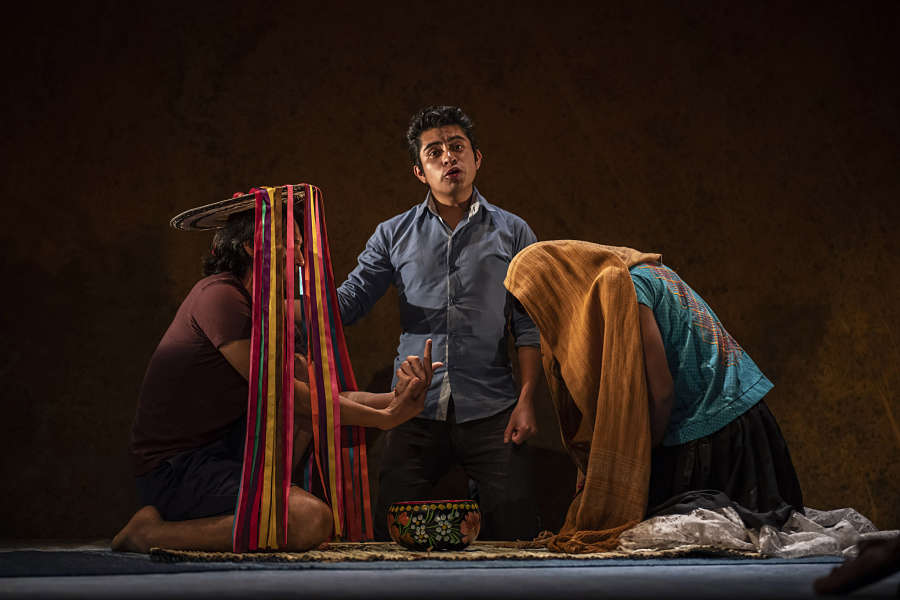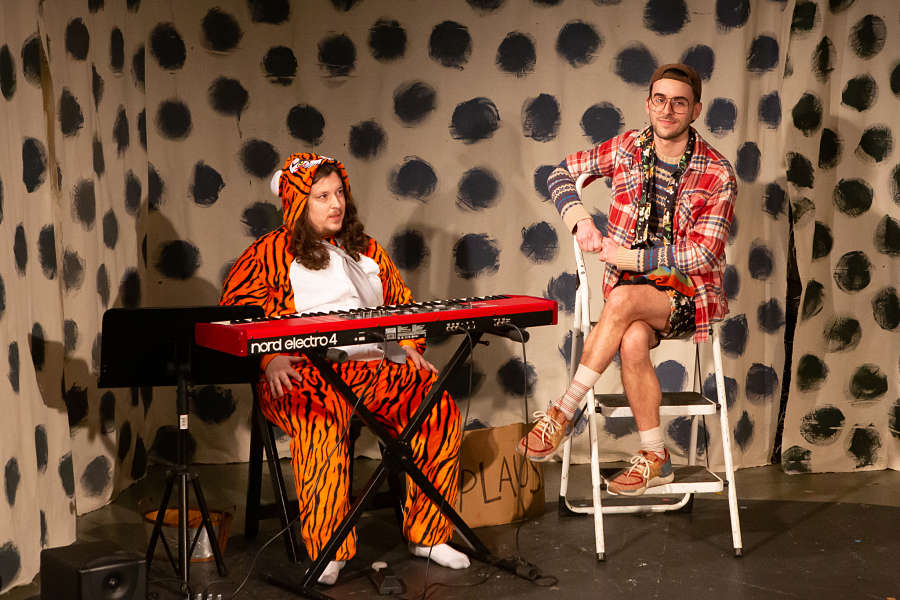In years past, I have happily gone truffle hunting for the best shows on offer in the spate of experimental theatre festivals held in New York in January. Each year, I would get a jolt of new year’s renewal from the explosion of performance talent and interesting work onstage.
January 2020 looked nothing like years past. The number of festivals taking place has plummeted, and some of my favorites have disappeared. Performance Space New York (formerly PS 122) stopped programming the COIL festival in 2018, favoring instead a year-round programming format. And this year American Realness, which once provided an inspiring array of diverse performance art and dance, did not happen at all.
Amid this decidedly shrunken field, I leaned heavily on the five-year-old Brooklyn-based Exponential Festival, with its 43 shows by emerging artists in its lineup. Meanwhile the granddaddy of the festivals, Under the Radar, reliably provided a number of international and American artists with a platform, mixing well-known names with up-and-comers. And I dabbled a little in Prototype’s slate of six new operas.
This year’s fests were not without their controversies. Under the Radar cancelled Josh Fox’s monologue, The Truth Has Changed, midway through the festival claiming Fox had verbally abused staff, with Fox pushing back, saying the venue itself was hostile to him. He suggested he was shut down because of the political substance of his show and suspected the Public Theater’s connection to oil and gas money was also a factor.
In fact, nothing in Fox’s show was surprising based on its festival description. It was a meandering look at the power of misinformation to lead us into war, protect corporations at the expense of citizens, and to manipulate elections. Fox centered the narrative around his own battles with the oil and gas industry as he made and tried to tour his anti-fracking documentary, Gasland. But his overdramatizing tone, full of whispered reverence at his own contemplation of his own personal woes, finally weighed heavier in this show than any well crafted arguments against big data or big energy.
Other artists found better ways to unite the personal with the political. The music-driven Andares (UTR), created by Makuyeika Colectivo Teatral and conceived and directed by Héctor Flores Komatsu, gave a platform to Indigenous artists from Mexico. Through myths, beliefs, songs, dances, and stories, this company of performers illustrated how cultures, languages, and identities can be erased by those in power. Sharing the experiences of people from different cultural backgrounds in Mexico in their own languages (Mayan, Zapotec, Tzotzil, and Wixarika), the four performers told us about how their land had been taken, how government corruption denied them their rights, how gender minorities were abused, and the risk of violence if they dared to push back. It was a window into how colonialism operates, in both the past and the present, and this collective performed with pride and honor toward ancestors who endured so much.

Another show which took inspiration from ancestors was Selina Thompson’s salt. (UTR), which looked at the emotional and physical toll of oppression, colonialism, and slavery. This piece followed Thompson, a Black artist from the U.K., as she recreated the path of the transatlantic slave trade. Actor Rochelle Rose performed as Thompson as she traveled from the U.K. to Ghana to Jamaica and back. From her interactions with a hostile, misogynistic sea captain who wanted to be called “master” to reveling in a verdant Jamaica, Thompson could not shake her own “European” gaze. She bore complex feelings toward a Europe that pushed back against her as a Black woman, yet was the place she calls home. As Rose told the story, she smashed a massive block of pink salt with a sledgehammer. Perhaps it was Thompson’s emotional labor made manifest, and Rose’s efforts to diminish it ended in sweat, mess, and exhaustion. Each of us was given a piece of salt to take home with us so that we can help do our part to carry the burden forward.
While covering a wholly different geography and history, there was an echo of Thompson’s grief, dislocation, and pain resonating through the work-in-progress Disclaimer (UTR) by Piehole (written by Tara Ahmadinejad). While the show was not open for review, I can report that Ahmadinejad’s show takes a timely and personal look at Iranian families separated by current government policy. It’s also a show about yearning for a simple gathering of all the people you love (and some you just tolerate–family!) in one room. For many Iranians, that basic desire is currently impossible to fulfill. Despite the homesickness and ache of this premise, Ahmadinejad uses playful audience participation to try to surround herself with a surrogate “family” of theatregoers. What resulted at the performance I saw was something silly, sweet, and moving.
Another show that was funny, charming, and not without bite was The Shadow Whose Prey the Hunter Becomes (UTR) from an Australian company comprised of disabled artists, Back to Back Theatre. The cast and director Bruce Gladwin collaboratively crafted the show, which confronted the audience with questions about both the benefits and harms of technology (automation, AI, devices) as it becomes more integrated into our lives. The actors were “translated” by voice recognition technology as they spoke, generating supertitles, which were sometimes accurate and sometimes not. Even among the cast, they challenged each other on how they wanted to be labeled—some were okay with being called intellectually disabled, others not—and treated by one another and the world. Their frustrations and concerns, delivered in a spiky, provocative way, pushed us to consider a future in which we may all be misunderstood, mistranslated, and mistreated by a world with technology in control.

Amid so many deeply serious shows, it was a pleasure to experience something outrageous and exuberant. British performance artist Lucy McCormick’s bold and unapologetic Triple Threat (UTR) set out to tell the story of the New Testament using “a little artistic license.” With a cast of three, McCormick took on the roles of Jesus, Mary Magdalene, and his mother Mary. With dance numbers, sung and lip-synched pop hits (Lady Gaga speaking for baby Jesus, Mary M. getting her Bieber on, Snow Patrol embodying the thoughts the Holy Mother), dildoes as microphones, Haribo gummies and Nutella as temptation, and the most profane doubting Thomas sequence one could ever see, McCormick found a perfect balance between the ridiculous and the sincere, such that when Mary cried over the death of her son I found myself crying along with her.
Exponential had a number of shows which delved into political questions, but with a more comedic approach. For Savannah Reich’s Caveman Play (Exponential), we were to imagine we were hunter-gatherers considering for the first time whether we wanted to give up that life for a new way of living called “agriculture.” Via a kind of PowerPoint presentation, arguments were presented for and against staying put to domesticate animals, plants, and ourselves. The joke of the play was that we know all what will actually happen to the world, and this is a kind of magical thinking—that we have the power to change the fate of the world if only we could go back in time and vote against agriculture. But it was the keyboardist dressed in a tiger onesie that hooked me. Named Douglas the Tiger (and played by a deadpan Ben Pagano), he just shrugged at these ridiculous humans and their neuroses, plans, and ideas. As a tiger, he just lived to eat (and play the keys), and no system, planning, or feelings got in the way of that. I loved every minute of Pagano’s musical stylings and droll contributions.
More wackiness ensued in the comedic play, Jupiter (Exponential), written by comedy troupe Simple Town. They imagined what would happen if the police infiltrated a group of anarchists by literally embedding themselves in the walls. It was set around a volatile couple—Spicoli-esque pretty boy Maximum and goth Jupiter—who were about to kick off the big insurrection, until they broke up for the millionth time. Meanwhile the cops, wearing tank tops, tighty-whities, and guns, painted their faces white to blend in with the walls, and set out scheming to keep the couple together so they could bust them when the revolution went down. Their antics got more and more extreme: A pile of spaghetti was hurled into the apartment like a grenade, almost sparking the Lady and the Tramp-like scene the cops are going for. The result: nonsense piled on top of chaos layered with delicious zaniness.
For a totally different but similarly effective kind of world-building, Elinor T. Vanderburg’s Bloodshot (Exponential) was a neo-noir dark comedy about nonstop anxiety gnawing at a fictional New York City where no one has been able to sleep for three years. While there was nothing comforting about this darkest timeline, Vandenburg’s play was carefully crafted, with vivid language and imagery, and first-rate support from director Sanaz Ghajar’s cabaret-style production. It crackled with sharp repartee, atmospheric projections, and a creeping sense of mystery mixed with smart self-awareness.
So even if my abiding memory of the 2020 festivals will remain how much I missed a broader selection of theatrical forms from the festivals that have disappeared—oh woe, so little delightful performance art weirdness!—I was happy to discover some new artists to watch for in the future, even if that future will be, according to these same artists, automated, sleepless, or ruined by agriculture.


